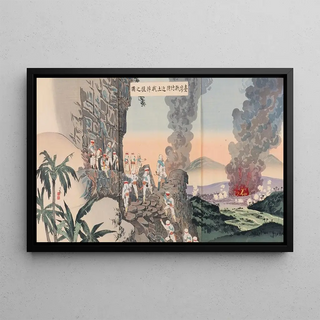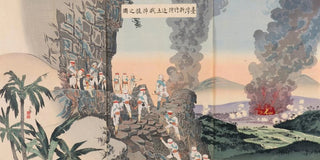Indigenous bandits captured in the surroundings of Xinzhu in Taiwan - Kobayashi Kiyochika


View from behind

Frame (optional)
Native Bandits Captured in the Vicinity of Xinzhu in Taiwan: a scene of confrontation and resistance
"Native Bandits Captured in the Vicinity of Xinzhu in Taiwan" depicts a dramatic moment where the palpable tension between the characters and their environment is highlighted. Dark, earthy tones dominate the canvas, emphasizing the seriousness of the situation. The technique used, likely a blend of oil painting and mixed media, brings the expressions of the characters to life, revealing their determination and resilience. This work, both powerful and evocative, invites the viewer to reflect on the struggles of indigenous peoples against external forces.
Native Bandits Being Swept up in the Vicinity of Xinzhu in Taiwan: a reflection of colonial history
The artist behind "Native Bandits Being Swept up in the Vicinity of Xinzhu in Taiwan" is set within a complex historical context, marked by colonization and cultural conflicts. Although the artist's identity is not clearly established, their work bears witness to the struggles of indigenous populations facing colonial expansion. Depictions of captured native bandits highlight not only resistance but also the richness of often little-known local cultures. This painting is a poignant reminder of the challenges faced by these communities, while also shining a light on their history and identity.
A decorative acquisition with multiple assets
The art print of "Native Bandits Captured in the Vicinity of Xinzhu in Taiwan" is a captivating piece that can enrich any space, whether an office, living room, or art gallery. Its strong visual impact and historical message make it a fascinating conversation piece. The quality of the reproduction ensures fidelity to the details of the original work, allowing full appreciation of its aesthetic appeal. By incorporating this art print into your decor, you bring not only a touch of originality but also a cultural and historical dimension to your interior.

Matte finish

View from behind

Frame (optional)
Native Bandits Captured in the Vicinity of Xinzhu in Taiwan: a scene of confrontation and resistance
"Native Bandits Captured in the Vicinity of Xinzhu in Taiwan" depicts a dramatic moment where the palpable tension between the characters and their environment is highlighted. Dark, earthy tones dominate the canvas, emphasizing the seriousness of the situation. The technique used, likely a blend of oil painting and mixed media, brings the expressions of the characters to life, revealing their determination and resilience. This work, both powerful and evocative, invites the viewer to reflect on the struggles of indigenous peoples against external forces.
Native Bandits Being Swept up in the Vicinity of Xinzhu in Taiwan: a reflection of colonial history
The artist behind "Native Bandits Being Swept up in the Vicinity of Xinzhu in Taiwan" is set within a complex historical context, marked by colonization and cultural conflicts. Although the artist's identity is not clearly established, their work bears witness to the struggles of indigenous populations facing colonial expansion. Depictions of captured native bandits highlight not only resistance but also the richness of often little-known local cultures. This painting is a poignant reminder of the challenges faced by these communities, while also shining a light on their history and identity.
A decorative acquisition with multiple assets
The art print of "Native Bandits Captured in the Vicinity of Xinzhu in Taiwan" is a captivating piece that can enrich any space, whether an office, living room, or art gallery. Its strong visual impact and historical message make it a fascinating conversation piece. The quality of the reproduction ensures fidelity to the details of the original work, allowing full appreciation of its aesthetic appeal. By incorporating this art print into your decor, you bring not only a touch of originality but also a cultural and historical dimension to your interior.






